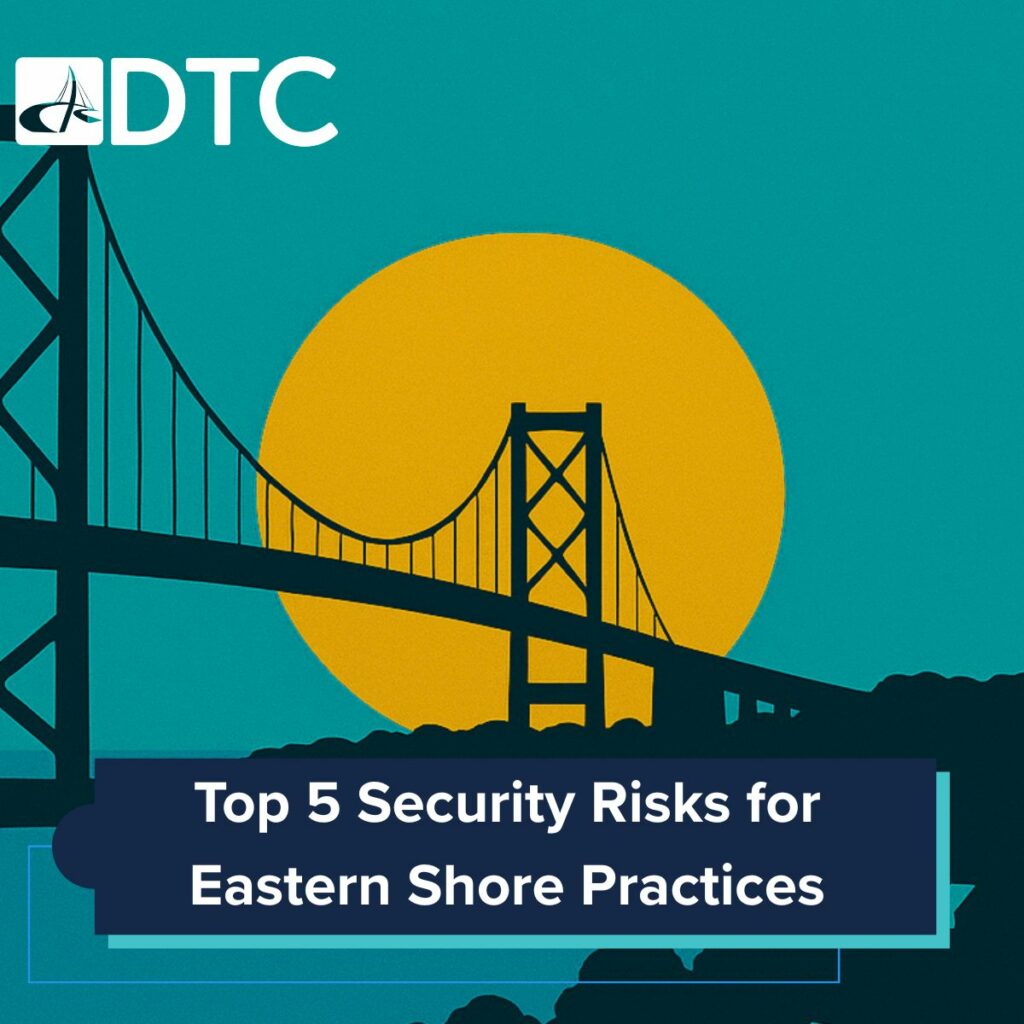
Top 5 Cybersecurity Risks Facing Eastern Shore Businesses
Think You’re Too Small to Be Targeted? Think Again. Many dental practices on Maryland’s Eastern Shore believe cybercriminals have no interest in them.
That’s exactly the mindset hackers count on.
If you run a dental practice or small business on Maryland’s Eastern Shore, it’s easy to assume hackers are focused on bigger targets. Today’s attacks are often automated and opportunistic, scanning the internet for any system with weak defenses. That means local businesses, especially those without dedicated IT support, are just as likely to be hit.
At DTC, we work with practices from Salisbury to Sussex, and we’ve seen a clear pattern: the longer a business delays cybersecurity planning, the more exposed it becomes.
Here are the top five threats facing local businesses — and how to stay ahead of them.
1.Ransomware: The Costliest Threat
What’s Happening: Ransomware attacks are increasingly common. Hackers now scan the internet for systems with weak defenses, no longer focusing solely on large corporations.
Local Impact: Eastern Shore businesses are equally at risk, especially those with outdated firewalls, unpatched software or no backup strategy. Once ransomware gains access, it can lock your files, disrupt your operations and force you into a tough decision: pay the ransom or have your practice go down.
Safety Steps You Can Start Today:
- Use secure, daily off-site or cloud backups
- Enable quick data restoration
- Keep your systems updated
- Install endpoint protection tools
2.Phishing emails aren’t the obvious scams they used to be.
What’s happening: Today’s cybercriminals are getting personal — using real names, familiar logos, and even local details to make their fake emails look legit. One wrong click? That’s all it takes to let them in.
Local Impact: A single, unguarded click can expose sensitive information or give attackers access to your systems. In smaller communities, attackers may even customize emails using specific names or local business details to increase credibility.
How to Stay Safe:
- Provide ongoing phishing prevention training
- Use multi-factor authentication (MFA)
- Encourage immediate reporting of suspicious emails
3.Outdated Systems = Open Doors
What’s Happening: We get it — no one loves spending money on new computers. But stretching the life of outdated systems comes with a hidden cost: they stop getting security updates and support. That’s like leaving the front door unlocked for cybercriminals.
Why It Hits Close to Home: When Microsoft stops sending security updates for Windows 10 in October, those systems basically turn into flashing neon signs for hackers. Dental practices across the Eastern Shore that delay upgrades could find themselves vulnerable — and scrambling to catch up.
How to Stay Safe:
- Now’s the time for a tech check-up.
Think of it like preventive care for your business — take a close look at your systems now to avoid bigger headaches later. - Swap out outdated equipment — especially your operating system, firewall, and router. Older tech is a magnet for security issues.
- Cloud platforms can make life easier — with automatic updates and built-in reliability to help keep your business running smoothly.
4.No Policies, No Protection
What’s Happening: Many small businesses are flying without a cybersecurity playbook. Without clear rules about passwords, who can access what data, and how to use mobile devices safely, employees are left guessing — and that’s a recipe for mistakes.
Impact on Practices Around You: Even the best tech can’t stop a breach if your team isn’t on the same page. Without straightforward policies, everyone handles threats differently — making it harder to manage risks and respond quickly.
How to Stay Safe:
- Create simple, easy-to-follow cybersecurity policies
- Cover key topics: passwords, data access, device use, and how to report incidents
- Work with experts (like DTC) who know how to build policies that actually get used
5.Compliance Gaps Can Cost You
What’s Happening: Many businesses on the Eastern Shore don’t realize they have strict data protection rules to follow. Healthcare, legal, and financial practices especially face tough compliance requirements — and penalties if they slip up.
Local Impact: Ignoring compliance risks more than fines — it puts client data and your reputation on the line. In a breach, you might be legally required to report it, which can lead to costly consequences.
How to Stay Safe:
- Get a thorough cybersecurity and compliance checkup
- Encrypt sensitive info to keep it safe
- Limit who can access protected data
- Stay up to date with HIPAA and industry rules
The Bottom Line
If you’re running a practice or business on Maryland’s Eastern Shore or in Delaware, cybersecurity isn’t something to put off. Threats are happening now — often targeting businesses just like yours.
The good news? You don’t have to go it alone.
Let DTC Help Secure Your Practice
We specialize in helping local businesses level up their IT security with enterprise-grade solutions. We’ll assess your network, identify weak spots, and build a clear plan to keep your practice safe and compliant.